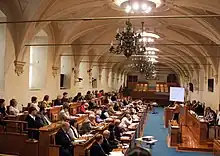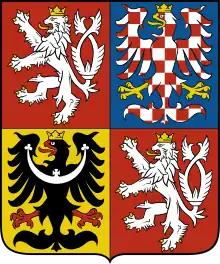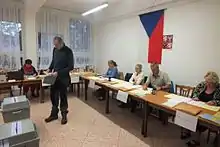Senate of the Czech Republic
The Senate (Czech: Senát Parlamentu České republiky), literally "Senate of the Parliament of the Czech Republic", is the upper house of the Parliament of the Czech Republic. The seat of the Senate is Wallenstein Palace in Prague.
Senate Senát Parlamentu České republiky | |
|---|---|
 | |
| Type | |
| Type | |
| Leadership | |
1st Vice-President | |
Vice-President | |
Vice-President | |
Vice-President | |
| Structure | |
| Seats | 81 |
Political groups | Supporting government (73)
Opposition (8) |
| Elections | |
| Two-round system Staggered elections | |
Last election | 23-24 September and 30 September-1 October 2022 |
| Meeting place | |
 | |
| Wallenstein Palace, Prague | |
| Website | |
| www.senat.cz | |
Structure
 |
|---|
|
|

The Senate has 81 members, chosen in single-seat constituencies through the two-round system. If no candidate receives a majority of votes in the first round, there is a second round between the two highest-placed candidates. The term of office for Senators is six years, and elections are staggered so that a third of the seats are up for election every two years. A candidate for the Senate does not need to be on a political party's ticket (unlike in the Chamber of Deputies).
The Senate has one President and four Vice-presidents.[1] Its members participate in specialised committees and commissions.[2][3] The Senate Chancellery has been created to provide professional, organisational and technical services. The Senate occupies several historical palaces in centre of Prague, in Malá Strana quarter. In 2005 its budget was 561.2 million CZK.
Powers
The Senate can delay a proposed law which was approved by the Chamber of Deputies but this veto can be overridden by a majority (i.e. at least 101 of all 200 members) of the Chamber of Deputies in a repeated vote. If the Senate proposes amendments, Chamber of deputies may approve it with a simple majority or override it with absolute majority. The Senate, however, cannot be overridden when it votes on electoral law, constitutional law and on international treaties.
The Senate decides on confirmation of judges of the Constitutional Court, proposed by the President. It often uses this power to block unacceptable nominants and may propose new laws. However, the Senate does not get to vote on the country's budget or on confidence in the government, unlike the Chamber of Deputies.
The President of the Senate is the second-highest official of the Czech Republic for ceremonial purposes, after the President of the Republic, but without much real political power.
History

The Senate was established in constitutional law of the Czech National Council (ČNR) No. 1/1993 on 16 December 1992.[4] The immediate reason for its creation was a need to find a place for members of the Federal Assembly, dissolved together with Czechoslovakia. Other reasons given were the positioning of the Senate as a safety device ("pojistka") correcting laws endorsed by lower chamber and as a power balancing tool against the dominance of a single party, especially regarding constitution and electoral law. Due to opposition by the Civic Democratic Alliance (who had members in the Czech National Council, which became the Chamber of Deputies under the new Constitution, but not in the Federal Assembly) and those politicians fearing dilution of power the Senate was not set up. The first elections were held in 1996, with voter turnout around 35% (much lower than turnout for the lower chamber). Further elections were held in accordance with the Constitution every two years after that.
The Senate has received criticism for being essentially powerless and unnecessary for a country of the size of the Czech Republic. However, the likely most prominent critic of Czech Senate, former prime minister Andrej Babiš, has expressed his plan to change the electoral into Chamber of Deputies into First-past-the-post voting, something that cannot be done without consent of the Senate, plus the Czech Constitution prohibits such system for lower chamber.
Latest election results
Results of the 2022 Czech Senate election.
| Party | First round | Second round | Seats | |||||||||
|---|---|---|---|---|---|---|---|---|---|---|---|---|
| Votes | % | Seats | Votes | % | Seats | Won | Not up | Total | ||||
| ANO 2011 | 244,516 | 21.98 | 1 | 149,331 | 31.12 | 2 | 3 | 2 | 5 | |||
| Civic Democratic Party | 151,908 | 13.65 | 0 | 111,071 | 23.15 | 8 | 8 | 15 | 23 | |||
| KDU-ČSL | 120,972 | 10.87 | 1 | 74,696 | 15.57 | 6 | 7 | 5 | 12 | |||
| Freedom and Direct Democracy | 85,855 | 7.72 | 0 | 2,791 | 0.58 | 0 | 0 | 0 | 0 | |||
| Mayors and Independents | 75,406 | 6.78 | 0 | 6,410 | 1.34 | 0 | 0 | 15 | 15 | |||
| TOP 09 | 73,473 | 6.60 | 1 | 33,341 | 6.95 | 2 | 3 | 3 | 6 | |||
| Czech Social Democratic Party | 43,870 | 3.94 | 0 | 10,344 | 2.16 | 0 | 0 | 1 | 1 | |||
| Independents | 32,431 | 2.92 | 0 | 9,031 | 1.88 | 1 | 1 | 0 | 1 | |||
| Czech Pirate Party | 28,302 | 2.54 | 0 | 0 | 2 | 2 | ||||||
| Senator 21 | 27,672 | 2.49 | 0 | 21,051 | 4.39 | 1 | 1 | 3 | 4 | |||
| PRO 2022 | 27,048 | 2.43 | 0 | 0 | 0 | 0 | ||||||
| Mayors for the Liberec Region | 19,613 | 1.76 | 0 | 14,000 | 2.92 | 1 | 1 | 1 | 2 | |||
| Communist Party of Bohemia and Moravia | 17,612 | 1.58 | 0 | 0 | 0 | 0 | ||||||
| Tricolour Citizens' Movement | 14,832 | 1.33 | 0 | 0 | 0 | 0 | ||||||
| Tábor 2020 | 14,186 | 1.28 | 0 | 10,676 | 2.23 | 1 | 1 | 0 | 1 | |||
| Svobodní | 11,730 | 1.05 | 0 | 0 | 1 | 1 | ||||||
| South Bohemians 2020 | 10,718 | 0.96 | 0 | 9,289 | 1.94 | 0 | 0 | 0 | 0 | |||
| Green Party | 8,828 | 0.79 | 0 | 0 | 0 | 0 | ||||||
| ProMOST | 8,672 | 0.78 | 0 | 6,747 | 1.41 | 1 | 1 | 0 | 1 | |||
| Union of Democrats – Association of Independents | 8,608 | 0.77 | 0 | 4,729 | 0.99 | 0 | 0 | 0 | 0 | |||
| Moravian Land Movement | 6,556 | 0.59 | 0 | 0 | 0 | 0 | ||||||
| Movement for Prague 11 | 6,524 | 0.59 | 0 | 5,569 | 1.16 | 0 | 0 | 0 | 0 | |||
| For Plzen | 4,683 | 0.42 | 0 | 0 | 0 | 0 | ||||||
| For Health | 4,276 | 0.38 | 0 | 0 | 0 | 0 | ||||||
| Choice for the Region | 4,226 | 0.38 | 0 | 0 | 0 | 0 | ||||||
| Karlovy Vary Civic Alternative | 3,972 | 0.36 | 0 | 0 | 0 | 0 | ||||||
| Manifest.cz | 3,319 | 0.30 | 0 | 0 | 0 | 0 | ||||||
| Ústí Citizen's Forum | 3,084 | 0.28 | 0 | 0 | 0 | 0 | ||||||
| Safety, Responsibility, Solidarity | 3,083 | 0.28 | 0 | 0 | 0 | 0 | ||||||
| No Movement | 2,822 | 0.25 | 0 | 0 | 0 | 0 | ||||||
| For Sport and Healthy Milestone | 2,768 | 0.25 | 0 | 0 | 0 | 0 | ||||||
| Freeholder Party of the Czech Republic | 2,617 | 0.24 | 0 | 0 | 0 | 0 | ||||||
| Independent for Prague 10 | 1,984 | 0.18 | 0 | 0 | 0 | 0 | ||||||
| Domov | 1,811 | 0.16 | 0 | 0 | 0 | 0 | ||||||
| Party of Common Sense | 1,587 | 0.14 | 0 | 0 | 0 | 0 | ||||||
| Czech National Socialist Party | 1,478 | 0.13 | 0 | 0 | 0 | 0 | ||||||
| Přísaha | 1,471 | 0.13 | 0 | 0 | 0 | 0 | ||||||
| PES Movement | 1,187 | 0.11 | 0 | 0 | 0 | 0 | ||||||
| Doma | 1,040 | 0.09 | 0 | 0 | 0 | 0 | ||||||
| Moravané | 954 | 0.09 | 0 | 0 | 0 | 0 | ||||||
| Heart for ... | 693 | 0.06 | 0 | 0 | 0 | 0 | ||||||
| State Party Direct Democracy – Labour Party | 396 | 0.04 | 0 | 0 | 0 | 0 | ||||||
| National Democracy | 290 | 0.03 | 0 | 0 | 0 | 0 | ||||||
| Democratic Party of Greens | 269 | 0.02 | 0 | 0 | 0 | 0 | ||||||
| Hradec Králové Democratic Club | – | 1 | 1 | |||||||||
| Marek Hilšer for Senate | – | 1 | 1 | |||||||||
| Ostravak | – | 1 | 1 | |||||||||
| Independents | 25,177 | 2.26 | 0 | 10,707 | 2.23 | 1 | 1 | 3 | 4 | |||
| Total | 1,112,519 | 100.00 | 3 | 479,783 | 100.00 | 24 | 27 | 54 | 81 | |||
| Valid votes | 1,112,519 | 96.47 | 479,783 | 99.60 | ||||||||
| Invalid/blank votes | 40,670 | 3.53 | 1,947 | 0.40 | ||||||||
| Total votes | 1,153,189 | 100.00 | 481,730 | 100.00 | ||||||||
| Registered voters/turnout | 2,749,658 | 41.94 | 2,479,869 | 19.43 | ||||||||
| Source: Volby | ||||||||||||
Elected senators
| Dictrict | Senator | Party | Note |
|---|---|---|---|
| 1 – Karlovy Vary | Věra Procházková | ANO 2011 | |
| 4 – Most | Jan Paparega | ProMOST | |
| 7 – Pilsen-City | Daniela Kovářová | Ind. | |
| 10 – Český Krumlov | Tomáš Jirsa | ODS | |
| 13 – Tábor | Marek Slabý | T2020 | |
| 16 – Beroun | Jiří Oberfalzer | ODS | |
| 19 – Prague 11 | Hana Kordová Marvanová | ODS | |
| 22 – Prague 10 | Jan Pirk | TOP 09 | |
| 25 – Prague 6 | Jiří Růžička | TOP 09 | |
| 28 – Mělník | Jarmila Smotlachová | ODS | |
| 31 – Ústí nad Labem | Martin Krsek | SEN 21 | |
| 34 – Liberec | Michael Canov | SLK | |
| 37 – Jičín | Tomáš Czernin | TOP 09 | |
| 40 – Kutná Hora | Bohuslav Procházka | KDU-ČSL | |
| 43 – Pardubice | Miluše Horská | KDU-ČSL | |
| 46 – Ústí nad Orlicí | Petr Fiala | KDU-ČSL | |
| 49 – Blansko | Jaromíra Vítková | KDU-ČSL | |
| 52 – Jihlava | Miloš Vystrčil | ODS | |
| 55 – Brno-City | Tomáš Töpfer | ODS | |
| 58 – Brno-City | Jiří Dušek | ODS | Originally elected for ANO 2011. |
| 61 – Olomouc | Lumír Kantor | KDU-ČSL | |
| 64 – Bruntál | Ladislav Václavec | ANO 2011 | |
| 67 – Nový Jičín | Ivana Váňová | KDU-ČSL | |
| 70 – Ostrava-City | Zdeněk Nytra | ODS | |
| 73 – Frýdek-Místek | Zdeněk Matušek | ANO 2011 | |
| 76 – Kroměříž | Jana Zwyrtek Hamplová | NEZ | |
| 79 – Hodonín | Eva Rajchmanová | KDU-ČSL |
Current composition of the Senate
| Party | Seats | ||||||||
|---|---|---|---|---|---|---|---|---|---|
| 2016 [lower-alpha 25] | 2018 | 2020 | TOTAL | ||||||
| Mayors and Independents | 3 | 5 | 11 | 19 / 81 | |||||
| Civic Democratic Party | 3 | 10 | 5 | 18 / 81 | |||||
| Christian and Democratic Union – Czechoslovak People's Party | 7 | 2 | 3 | 12 / 81 | |||||
| ANO 2011 | 3 | 1 | 1 | 5 / 81 | |||||
| TOP 09 | 2 | 1 | 2 | 5 / 81 | |||||
| Czech Social Democratic Party | 2 | 1 | — | 3 / 81 | |||||
| Senator 21 | — | 1 | 2 | 3 / 81 | |||||
| Czech Pirate Party | — | 1 | 1 | 2 / 81 | |||||
| Green Party | 1 | — | — | 1 / 81 | |||||
| Svobodní | — | — | 1 | 1 / 81 | |||||
| Severočeši.cz | 1 | — | — | 1 / 81 | |||||
| Ostravak Movement | — | 1 | — | 1 / 81 | |||||
| Hradec Králové Democratic Club | — | — | 1 | 1 / 81 | |||||
| Movement for Prague 11 | 1 | — | — | 1 / 81 | |||||
| Marek Hilšer for Senate | — | 1 | — | 1 / 81 | |||||
| United Democrats — Association of Independents | 1 | — | — | 1 / 81 | |||||
| Citizens Together — Independents | 1 | — | — | 1 / 81 | |||||
| Citizens Patriots | 1 | — | — | 1 / 81 | |||||
| Independents | 1 | 3 | — | 4 / 81 | |||||
| Total | 27 | 27 | 27 | 81 | |||||
Sources: Senate,
| |||||||||
See also
Notes
References
- Senators Senate website
- Senate Committees Senat website
- Senate Commissions Senate website
- Ústavní zmìny v dobì od pádu komunismu Bulletin Scientia Politica (in Czech)
External links
- Official website
- Kysela, Jan (n.d.). "Bicameralism in the Czech Republic: Reasons, Functions, Perspectives". Retrieved 9 October 2021.